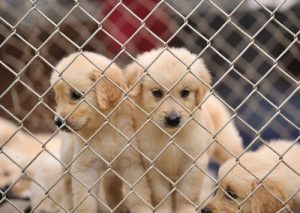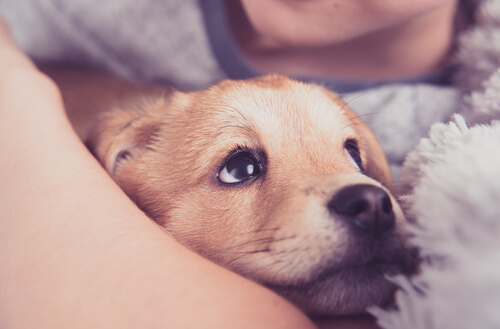Stop Puppy Mills!

So-called puppy mills are where dogs, cats or other animals are bred in mass, without adhering to schedules or rules that any serious breeder should follow. It is a big business, responsible for, among other things, filling pet store windows with puppies and manager’s pockets with money. There is little regard for the welfare of the animals.
Facts about puppy mills

Commonly known as puppy mills, these puppy factories have expanded more than we ever imagined. The estimate is that there are about 10,000 in the U.S. alone.
In order to “produce” more puppies at a lower cost and thus be able to sell more of them for cheap, the animals edure all kinds of deprivation and mistreatment.
That’s why it’s important to become aware of the situation and stop supporting it. Ideally, you would adopt a pet. But if you do decide to buy one, do it in a safe place where you’re sure that the animal was raised in excellent conditions.
If you love animals, don’t buy them from puppy factories. Choose adoption or buy them from trustworthy breeders.
Living conditions of animals in puppy mills
In puppy mills, animals tend to live in crowded cages or containers, exposed to infection with all kinds of diseases. They may also be tied up in the open.
- They don’t spend enough time with their mothers.
- The animals are not properly fed.
- They are not socialized.
- Nobody walks them or plays with them, much less pampers them.
- They do not receive necessary vet check-ups
- They are not vaccinated on a correct timetable.
- The animals are sold before reaching the weight and age required by law and sometimes their pedigree and health papers are falsified.
- The puppies may be transported on trucks and die during the ride. Travel can be very long — even from one country to another — and in terrible conditions.
Puppies and their mothers
In addition, they also live in overcrowded housing and don’t get attention or adequate food. Once they stop being useful, puppy mill owners auction them off or kill them.
Conditions of animals bred in puppy mills
If you knowingly or unknowingly buy a puppy from a puppy mill, you may see the following problems:
- Health problems within a few days of purchase. Common are parvovirus, brucellosis, distemper, scabies and canine infectious tracheobronchitis, in addition to internal and external parasites. Because there are no proper tests, genetic diseases are a risk too.
- Personality or behavior problems. They are usually fearful, insecure or aggressive animals.
- Socialization problems with humans, given the scarce contact they have had with people during their stay in these mills.
Don’t buy animals raised in puppy mills

If you want to keep this business from growing, here are recommendations for getting a new pet:
- Only buy from responsible and recognized kennels.
- Don’t buy puppies in stores that show them in store windows.
- Don’t trust prices that seem too low.
- Do not buy animals online or through newspaper advertisements.
Also, contact the authorities to report a puppy mill – although they are hard to locate – and shops that treat animals cruelly. Remember, if there are no customers, there is no business. It’s that simple. Adoption is the better choice.
So-called puppy mills are where dogs, cats or other animals are bred in mass, without adhering to schedules or rules that any serious breeder should follow. It is a big business, responsible for, among other things, filling pet store windows with puppies and manager’s pockets with money. There is little regard for the welfare of the animals.
Facts about puppy mills

Commonly known as puppy mills, these puppy factories have expanded more than we ever imagined. The estimate is that there are about 10,000 in the U.S. alone.
In order to “produce” more puppies at a lower cost and thus be able to sell more of them for cheap, the animals edure all kinds of deprivation and mistreatment.
That’s why it’s important to become aware of the situation and stop supporting it. Ideally, you would adopt a pet. But if you do decide to buy one, do it in a safe place where you’re sure that the animal was raised in excellent conditions.
If you love animals, don’t buy them from puppy factories. Choose adoption or buy them from trustworthy breeders.
Living conditions of animals in puppy mills
In puppy mills, animals tend to live in crowded cages or containers, exposed to infection with all kinds of diseases. They may also be tied up in the open.
- They don’t spend enough time with their mothers.
- The animals are not properly fed.
- They are not socialized.
- Nobody walks them or plays with them, much less pampers them.
- They do not receive necessary vet check-ups
- They are not vaccinated on a correct timetable.
- The animals are sold before reaching the weight and age required by law and sometimes their pedigree and health papers are falsified.
- The puppies may be transported on trucks and die during the ride. Travel can be very long — even from one country to another — and in terrible conditions.
Puppies and their mothers
In addition, they also live in overcrowded housing and don’t get attention or adequate food. Once they stop being useful, puppy mill owners auction them off or kill them.
Conditions of animals bred in puppy mills
If you knowingly or unknowingly buy a puppy from a puppy mill, you may see the following problems:
- Health problems within a few days of purchase. Common are parvovirus, brucellosis, distemper, scabies and canine infectious tracheobronchitis, in addition to internal and external parasites. Because there are no proper tests, genetic diseases are a risk too.
- Personality or behavior problems. They are usually fearful, insecure or aggressive animals.
- Socialization problems with humans, given the scarce contact they have had with people during their stay in these mills.
Don’t buy animals raised in puppy mills

If you want to keep this business from growing, here are recommendations for getting a new pet:
- Only buy from responsible and recognized kennels.
- Don’t buy puppies in stores that show them in store windows.
- Don’t trust prices that seem too low.
- Do not buy animals online or through newspaper advertisements.
Also, contact the authorities to report a puppy mill – although they are hard to locate – and shops that treat animals cruelly. Remember, if there are no customers, there is no business. It’s that simple. Adoption is the better choice.
This text is provided for informational purposes only and does not replace consultation with a professional. If in doubt, consult your specialist.








